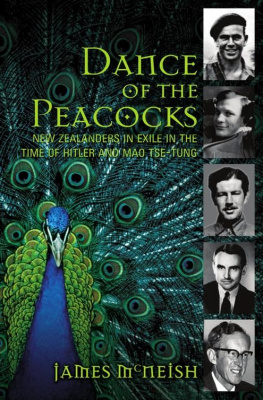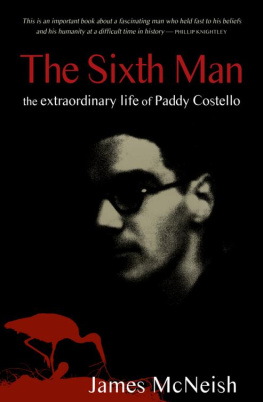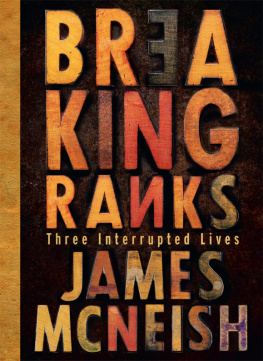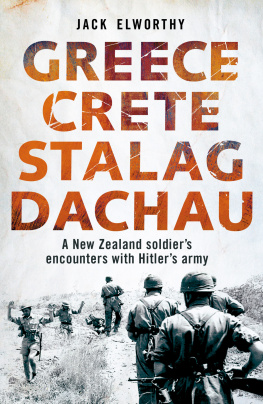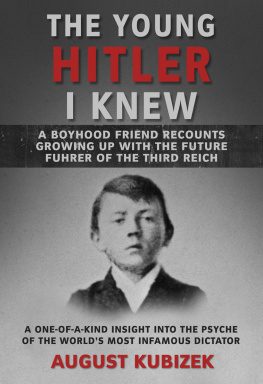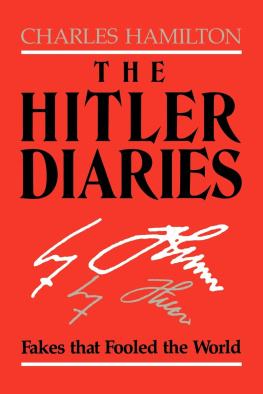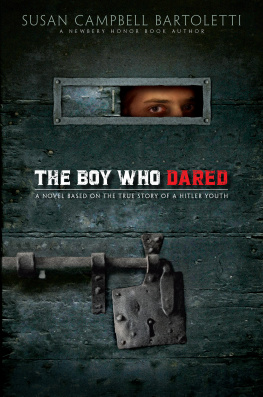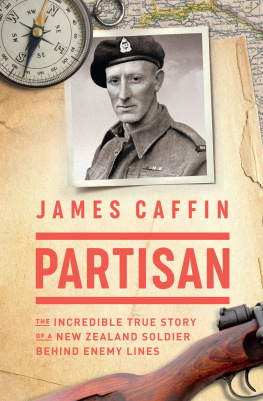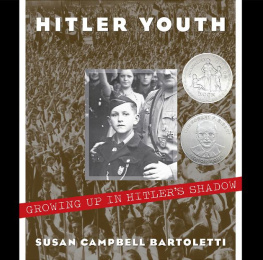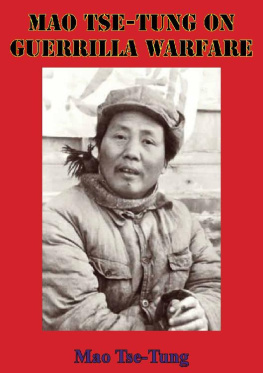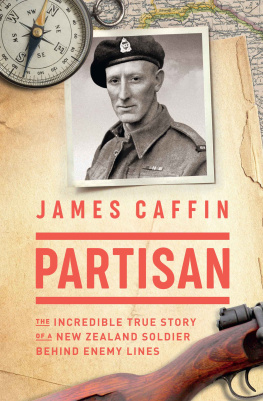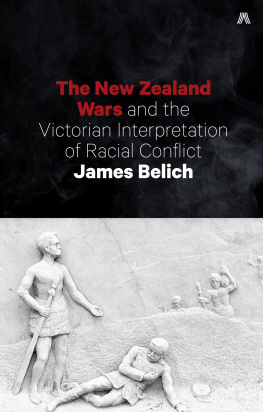Altogether they knew five wars, three revolutions and - in the case of Ian Milner, accused in the Cold War of being a spy - a slander. This is a fascinating story based on letters, diaries and interviews in several countries. It is the story of a group of Rhodes scholars, five young men - James Bertram, Geoffrey Cox, Dan Davin, Ian Milner, John Mulgan - caught up in the turmoil of their times: Spain, Hitlers Germany, Greece and North Africa, Eastern Europe, China. They left New Zealand in the thirties for the dreaming spires of Oxford. War intervened. Only one returned.
From reviews of The Dance of the Peacocks:
Not one Colossus of Rhodes, but five of them, and the brilliance of this work by James McNeish is to weave their stories into one compellingly readable tale. They were all New Zealanders; they were all Rhodes scholars, bar one. They were writers and soldiers and diplomats and adventurers. They were the cream of their generation, pathfinders, cultural explorers who went where few Kiwis had been before
This is a work of scholarship equal to the academic virtues it unashamedly celebrates. There are signposts aplenty here on the road map to a fledgling cultural identity. But it is also a rattling good yarn which amply underlines the gifted and underrated literary talents of the author.
Simon Cunliffe in The Press
Dance of the Peacocks is the work where all of McNeishs gifts come together. The novelist, the biographer and the political journalist combine in this account of five New Zealanders who went to Oxford in the 1930s and became embroiled in the international political maelstrom of those times
In both general concept and concrete avocation, in pattern and in detail, this is a remarkable book.
Lawrence Jones in Dominion Post
Such is McNeishs skill that the book hangs together with, yes, the shape of a novel and the grip of a thriller.
McNeish has walked a lone trail in New Zealand writing for 45 years. The young journalist who did six years on the New Zealand Herald in the 50s before becoming a fulltime writer in 1964 has travelled widely, carrying out what you might call a McNeish market of his own, while remaining, as Iain Sharp remarks, private, elusive, inviolable.
Denis Welch in NZ Listener
Dance of the Peacocks is one of the most richly fascinating New Zealand non-fiction books for many years.
Iain Sharp in Sunday Star-Times
McNeish writes that these are not biographies in any form or sense. With only 400 pages that is hardly surprising, and not really an appropriate measure of the books success. What does matter is that, through these stories, he succeeds in repatriating for us something of what was exported, and thought lost.
Felicity Barnes in New Zealand Herald
for
HELEN
whose idea this book was
CONTENTS
The Road to Oxford, Spain & China
19241939
The War Against Hitler
19391945
Cold War and After
19461993
Cover: top to bottom, John Mulgan, Dan Davin, James Bertram, Geoffrey Cox, Ian Milner The photograph of Dan Davin, taken at Balliol in 1937, is Gordon Craig.
SECTION 1
SECTION 2
SECTION 3
SECTION 4
SECTION 5
MAPS
----------
Every effort has been made to trace copyright holders for illustrations used in this book. The publishers will be glad to make proper acknowledgment in future editions in the event of any omissions that occurred at the time of going to print
| ASIO | Australian Security Intelligence Organisation |
| Bach | Weekend or seaside cottage |
| Buttery | College bar-cum-reception area, near the dining hall |
| Crib | Holiday cottage, Southland version of bach |
| EAM | Political wing of ELAS, as Sinn Fein to the IRA |
| ELAS | Coalition of left-wing Greek resistance groups, largely controlled by the Greek Communist Party |
| JCR | Junior Common Room |
| LCV | Light carrying vehicle |
| Maadi | Suburb of Cairo, site of 2 NZEF HQ |
| FBA | Fellow of the British Academy |
| MEF | Middle East Forces |
| MI5 | British Security Service |
| OSS | Office of Strategic Services, forerunner of the CIA |
| Samizdat | Typed manuscript that dissidents copied on their own typewriters with fading carbons and passed from hand to hand |
| Schools | Final examinations for an Oxford degree |
| SOE | Special Operations Executive, forerunner of MI5 |
| StB | Statn Bezpenost, State Security Police. The StB was part of the Czech Interior Ministry |
| Subfusc | formal academic dress (from fuscus, dark) |
| swagger | tramp |
| tangi | Maori wake (tangi, lamentation) |
| tiki | amulet or figurine in the form of a carved representation of an ancestor (from Maori) |
| verballed | the recording in a notebook of a statement or confession which was never made |
| Viva | Face-to-face oral examination |
| Wykehamist | Former pupil of Winchester College |
THE BOOK DRAWS upon the letters and diaries of five men, besides the reminiscences of family and friends.
It is the story of a group James Bertram, Geoffrey Cox, Dan Davin, Ian Milner and John Mulgan although, since it is doubtful if they were ever all together in the same room at one time, the word group needs an explanation. The five were New Zealanders who came to Oxford in the 1930s. They were the generation that made good, coming Home to England. But since they were also (except Mulgan) Rhodes Scholars, motivated by Cecil Rhodess ideal to be of service, they became involved Bertram with revolutionary China and Milner with communist Czechoslovakia. Mulgan, Davin and Cox chose to fight fascism in Europe. Mulgan, like Camus, joined the Resistance.
They all knew war. Altogether they knew five wars, three revolutions and in the case of Milner, accused in the Cold War of being a spy a slander.
They had in common the Depression. Having experienced one Depression in New Zealand, in England they encountered another, followed by the rise of fascism in Spain and the Second World War. The war marked them, and they became exiles.
They were further exiled by their scholarship.
Some years ago in Oxford I came upon a letter by Lord Lothian, General Secretary to the Rhodes Trust in Britain, written to his counterpart in New Zealand. Writing in 1933, Lothian inquired if it were true that Rhodes Scholars were not welcome or encouraged when they returned to New Zealand. For in practically every other case, he said, except New Zealand and Bermuda, Rhodes Scholars did return to their country of origin. Were returning Rhodes Scholars not wanted in New Zealand? Lothians question stayed with me. When, in 1998, I was invited to look at their private papers (three of the group had recently died; a fourth, John Mulgan, died in the war) the question reasserted itself.
As I researched the book, it became apparent that instead of a passport to leadership and high office, as Rhodes intended, a Rhodes Scholarship to the returning New Zealander might prove less a gift than a burden, even a stigma. Was that what their papers were telling me? In part the book is an attempt to answer that question.
I am much in debt to Margaret Calder, chief librarian of the Alexander Turnbull Library, Wellington, for granting access to a wealth of unpublished papers and to the staffs of that library and the National Library of New Zealand for making me welcome and easing my path; to Gabrielle Day, the widow of John Mulgan, and Sir Geoffrey Cox, for private papers and hours of liberating talk spread over thirty years. Full acknowledgement to the many who have helped will be found in the Notes.

